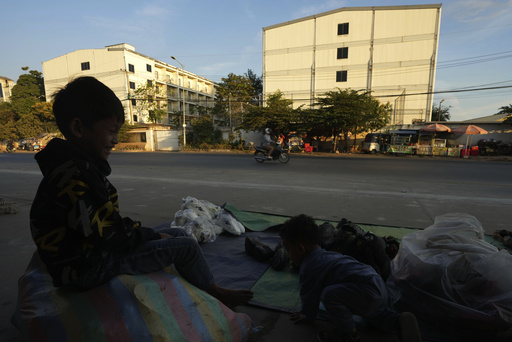
BANGKOK — The suspension of foreign aid by President Donald Trump has significantly impacted efforts to combat human trafficking and forced labor in Cambodia, where a vast number of individuals are imprisoned and coerced into working in call centers that conduct telephone scams.
According to estimates from the United Nations, hundreds of thousands are employed in isolated facilities throughout Cambodia, Myanmar, and Laos, engaged in online scams targeting victims globally, including citizens of the United States. Many of these individuals are trafficked under false pretenses and forced to labor against their will.
A shelter managed by the Catholic charity Caritas, which has been a refuge for individuals escaping these compounds, is reportedly considering halting its operations due to financial constraints. This shelter is located in Phnom Penh and is notably the only one that assists victims of scam-related situations, whether they are Cambodian nationals or foreigners. Two sources familiar with the situation, who requested anonymity fearing potential repercussions from the Trump administration, indicated that the shelter may soon stop intake.
The funding withdrawal has not only disrupted the shelter’s operations but has also halted crucial rescue initiatives and related activities aimed at preventing human trafficking. These online scam operations are allegedly backed by certain local elites. In October, a prominent member of the Cambodian People’s Party, Ly Yong Phat, was sanctioned by the U.S. for owning businesses that exploit people and force them into scam operations.
This setback for civil society efforts comes at a time when independent media and activist networks addressing the scam operations are already facing substantial governmental pressure. Numerous independent journalism outlets have been shut down, and an investigative journalist in Cambodia, who extensively reported on the scam facilities, was arrested.
Beginning in January, the Trump Administration enacted a freeze on U.S. foreign assistance, affecting various global initiatives ranging from providing HIV medications to humanitarian aid for conflict-displaced individuals.
Jake Sims, a co-founder of Shamrock, a public-private partnership dedicated to combating organized cybercrime, emphasized that while other shelters exist in Cambodia, the Caritas facility stands out as the “only qualified and competent shelter.” It provides victims with trauma-informed care and assists with visa and legal support to help them return home.
The Caritas shelter previously received financial backing from Winrock International, a partner of USAID in Cambodia, and was set to acquire roughly $1 million from USAID over two years. In addition, the shelter was partially funded by the International Organization for Migration, a U.N. agency predominantly financed by the U.S. government.
There was no response from USAID, IOM, or the Cambodian government when asked for comments on the situation.
Those who do manage to escape from the compounds may do so through their own efforts, sometimes jumping from windows, or by relying on a limited number of rescue operators collaborating with Cambodian law enforcement. There is also a government-operated rescue hotline available.
However, the challenges of returning home for these escapees are significant. Many find themselves in police custody before being transferred to immigration detention, often held for extended periods. Because they frequently enter the country illicitly and lack savings, they might require legal assistance. Mina Chiang, founder of Humanity Research Consultancy, which has conducted studies on the scam compounds, noted the importance of shelters in preventing re-trafficking.
“In 2022, we encountered situations where Taiwanese survivors became homeless after escaping the scam centers,” she remark, adding that there were reports of survivors being targeted for re-trafficking after their escape.
Li Ling, a rescue worker involved with the Caritas shelter, disclosed that funding cuts have forced her to cease her rescue efforts for scam workers. Following the shelter’s stop-work order, six victims left, and two have since vanished. Li expressed concerns that these individuals may have ended up back in exploitative environments, particularly as they lacked financial resources and were desperate finding jobs for survival.
Other victim support organizations have equally suffered due to the funding freeze, including those that offer medical assistance to individuals injured during escapes. One organization previously aided a victim requiring emergency surgery after jumping from a building to flee a scam compound, but those funds are now inaccessible.
The funding halt has also led to the cancellation of many preventive programs aimed at combating human trafficking. A non-profit had planned to launch training initiatives with community journalists throughout Southeast Asia to raise awareness about the recruitment tactics employed by scam centers. Another labor-focused group had intended to educate labor unions in six countries regarding recognizing trafficking indicators. However, these entities opted to remain unnamed due to fears of government retaliation.
Continuing research designed to monitor developments in scam activities and analyze government responses in Cambodia has also been put on hold due to funding cuts. USAID’s counter-trafficking initiative employed research consultants to compile reports on criminal activities, which were occasionally shared with U.S. Congressional staff and other governmental divisions.
Jake Sims warned that the withdrawal of U.S. support is likely to propel further suppression of civil society efforts. He highlighted that Cambodian authorities had recently arrested a well-regarded investigative journalist who had covered the rise of scam operations within the country. Following significant international interest and support from local media organizations, journalist Mech Dara was released on bail after roughly a month but later announced his departure from journalism.
Moreover, if new funding becomes available, the cost of reinstating anti-trafficking programs may exceed initial estimates, given that programs have been disrupted and contract personnel have been laid off. “The repercussions of the USAID funding freeze extend far beyond the issue of trafficking; they empower criminal networks and facilitate the expansion of their operations,” observed Chiang.

